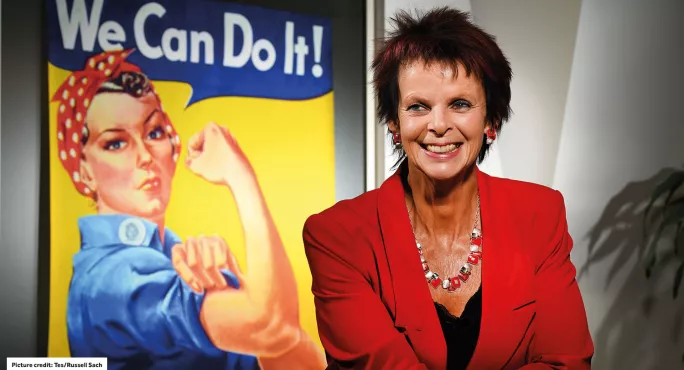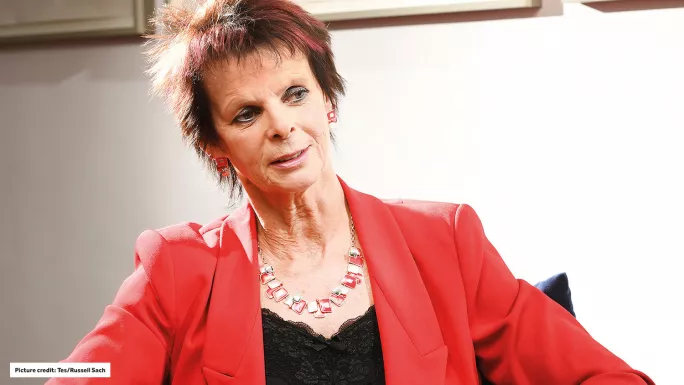- Home
- ‘Everybody deserves a second chance - and a real choice’
‘Everybody deserves a second chance - and a real choice’

She may be a minister at the Department for Education, but Anne Milton describes herself as a “reluctant learner”.
“There’s always, in any class, the group of kids who mess around, have too much fun. That was me,” she recalls. “I was never at the front of the class - I was always at the back.”
In June, Milton was appointed apprenticeships and skills minister. On the face of it, her traditional grammar school education in West Sussex appears far removed from the sector she now finds herself overseeing.
But technical and vocational education is an area Milton has long felt passionate about, she tells Tes. “I was at a grammar school a very long time ago - I’m 62 - and it was a very high-achieving school, one of the best in the South East. Lots of people went to university. We were streamed. There was an assumption you would go to university.”
The teenage Milton, however, had other ideas. “I remember even then, as a child, saying, ‘I don’t understand why everyone feels you have to go to university.’ I felt, even as an 18-year-old, that there was a push from the school for us to go down a certain course, because they wanted to tick their boxes. So it was less about what we, as schoolchildren, should be doing in our careers.”

Now, five months on from her appointment, Milton’s passion for education is starting to become visible. In contrast to the evangelising about apprenticeships that became the hallmark of her predecessor Robert Halfon, Milton has spent the first few months quietly getting on top of her ministerial responsibilities.
“I think what’s quite important is that you try to understand your brief first,” she says. “It’s the way women do their business. Women like to know what they’re dealing with, understand the parameters and then they will take a step. That’s how women do it.
“Men - I’m being very generalised - men tend to leap in with both feet. As I say, I think women take a more cautious approach.”
She continues: “We know lots of male politicians who’ve leapt in…” Milton pauses, before starting the sentence again. “We know lots of people who’ve leapt in with both feet. Actually, it’s quite important to make sure you get your head around what you’re doing. Understand the system and make the decisions that you need to make, to continue business as usual. And then come out and start talking more about it.”
For a minister who describes her approach as cautious, Milton’s sparsely-decorated office at the Department for Education gives a few insights into her approach.
Posters promoting apprenticeships and the export of UK FE sit alongside another from the Government Equalities Office, proclaiming “We support gender pay gap reporting” - an issue close to the heart of Milton, who also holds the title of minister for women.
Milton’s passion for equality is expressed more powerfully through a print of the iconic “We Can Do It!” image of a strong female war production worker, widely adopted by feminists during the 1980s. She told the Association of Colleges’ (AoC) annual conference last month that she considers herself a “born-again feminist”.
The desire to see more women in Westminster was one of the two main reasons Milton became an MP, she explains. “I thought there weren’t enough women involved in politics - and there weren’t enough people with frontline experience of the public sector.”
Milton’s pre-politics career goes someway to addressing the latter concern. Having trained as a nurse at St Bartholomew’s Hospital in London, she worked for the NHS for 25 years, as a district nurse and for people requiring palliative care.
“The wonderful thing about nursing - I did most of my nursing in London - is you see this extraordinary cross-section of society,” she explains. “And what you realise, I suppose, if you’re working in hospitals, is that it doesn’t matter where people come from or what their background is. They are all treated the same.”
Life experience
A period working at the Salvation Army-run Mothers’ Hospital in Hackney - at the time, one of the most deprived boroughs in the country - particularly influenced Milton.
“There was a hospital opposite for unmarried mothers,” she recalls. “As a bright-eyed, bushy-tailed young girl from Sussex, I can remember working in the clinic. And probably at that time, nearing 50 per cent of the young girls we saw were under 16.
“I can remember going into the Department of Health as a minister [Milton served as junior health minister from 2010-2012], talking about pregnancies for girls under 18 and thinking, ‘This is nothing new to me.’”
Spending a quarter of a century in the NHS has served Milton well for her second career in politics, she believes. “I feel very fortunate that that opportunity opened itself up,” she says. “I suppose I feel that everybody deserves a second chance - and everybody deserves a real choice. For kids in school, irrespective of how well you’re doing, you need to know there’s real choice, so its not an automatic assumption you will go to university...You might well choose further education because of the options it offers you, which are much more varied than they are in higher education.”
Addressing college leaders at the AoC conference before the autumn budget, Milton vowed to “bang on the door of the Treasury” to lobby for more funding for the sector.
While some modest pockets of funding were announced - including £40 million to create “Further Education Centres of Excellence” and £20 million to support the introduction of T levels - calls for significant additional investment in FE went largely unheeded by chancellor Philip Hammond.
On the funding challenges facing the sector, Milton remains philosophical. “I think the job of any minister is to deliver the policy, make sure what’s in your ministerial portfolio works, but every minister should be an advocate for their sector. And I will always be an advocate. No money is ever enough - you always want more, of course you do. And it’s important to keep reminding people why this is important.”
More positive, Milton feels, was the prominence of FE in the government’s industrial strategy White Paper unveiled this week. The word “skills” was mentioned “over 100 times” in the document, she enthuses. But despite the focus on initiatives such as T levels and Institutes of Technology, Milton is under no illusions about the scale of the challenge the government faces in overhauling technical education.
“A mistake you can make as a politician is to imagine that you tip up as a new minister and you suddenly have the silver bullet that’s going to solve the problem. Actually, what you should do is have sufficient humility to realise that, with the best possible intentions, lots of previous governments have tried to do something here and haven’t succeeded.
“So it’s not straightforward, but it feels to me we’re in a good place to make sure we do something and we do get the skilled workforce that we need.”
‘Bedding in’ the levy
One of the main issues for the DfE to address is the drop-off in apprenticeship starts since the introduction of the levy. Large employers with a payroll bill of £3 million or more are required to pay 0.5 per cent of this bill towards the apprenticeship programme - and can then draw back funding to train up apprentices themselves. But while the move has been hailed as a game-changer and a key lever in the government hitting its target of creating 3 million apprenticeship starts by 2020, figures published last week revealed the number of starts between May and July was just 48,000 - almost 60 per cent down on the same period in the previous year.
The drop, Milton insists, was no surprise. “We expected a drop in starts, we knew that would happen. So even though it looks quite dramatic, it was what we anticipated.”
“I’m not worried about the drop in apprenticeship starts,” she continues. “I’d like to see it now go up. As the system beds in, as employers realise they’ve got money in the account they’re not spending.”
Milton also says she has “made it clear” to the Institute for Apprenticeships that it needs to “really speed up” the process of approving new apprenticeship standards for delivery.
Beyond the teething troubles behind the scenes, Milton reveals that the main change she hopes to achieve is how FE is perceived.
“I want a shift in attitude from parents. I’d like parental expectations to change. I’m the mother of four children, so that plays in there. I think a lot of parents expect their children to go to university, or feel their children are defined by going to university. I would like that to change.”
Keep reading for just £1 per month
You've reached your limit of free articles this month. Subscribe for £1 per month for three months and get:
- Unlimited access to all Tes magazine content
- Exclusive subscriber-only stories
- Award-winning email newsletters



